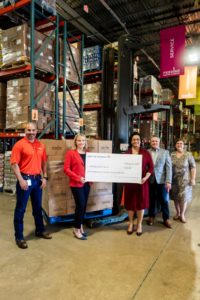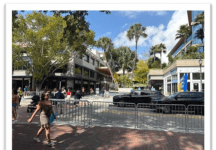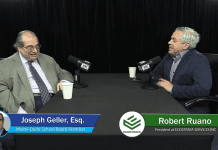|
Getting your Trinity Audio player ready...
|

Bank of America in Miami-Dade and Broward counties recently announced a $120,000 combined donation worth 1,080,000 meals to Feeding South Florida to address food insecurity in the region. In addition, Bank of America in Miami-Dade County also gave Banco de Alimentos de Puerto Rico $25,000 to help address food insecurity in that region.
It is estimated that 1 in 9 South Floridians are food insecure, with over 700,000 people not knowing from where they will get their next meal, according to Feeding South Florida. As the pandemic continues, hunger relief organizations in Miami-Dade and Broward counties and across the country are facing ongoing challenges, such as increased demand for their services and rising food prices.
Bank of America is supporting its employees’ health and safety while addressing one of the local communities’ most critical needs. Earlier this year, the company announced it would make a $100 donation to local hunger relief organizations and food banks for each employee who received a COVID-19 booster shot or vaccine and notified the bank before the end of January to address the increased need in that region.
Feeding South Florida is the fifth largest food bank in the United States and the leading domestic hunger relief organization serving 25 percent of the state’s food insecure population throughout Palm Beach, Broward, Miami-Dade, and Monroe counties.
This donation will allow Feeding South Florida to continue the rollout of its innovative programs including culinary and warehouse training, its “Food Is Medicine” initiatives such as the Mobile FARMacy and hospital pantries, the creation of cutting-edge technology designed to measure output in real time, home delivery programs, providing wraparound services like SNAP benefits, Summer BreakSpots, and so much more.
For every $1 donated, the organization can provide nine meals to the community. With help from the bank’s donation, Feeding South Florida is providing 1,080,000 meals to individuals and families throughout South Florida.
The bank has been a partner of Feeding South Florida since 2010 and in that time, the bank, via the Miami-Dade and Broward County markets, has granted the organization with nearly a million in financial support.
“We are incredibly grateful to Bank of America for its generous donation to help us put food on the table for South Florida families who need it the most,” said Paco Vélez, president and CEO of Feeding South Florida. “This donation comes at a critical time, when the demand for food has increased significantly due to the COVID-19 pandemic, inflation at its highest in 13 years, and the cost of food rising.”
Nationally, the bank has committed $10.6 million to food banks and hunger relief organizations through this effort. Since 2015, Bank of America has donated nearly $150 million toward hunger relief efforts.
“As the pandemic continues to impact Miami-Dade and Broward counties, food banks and hunger relief organizations such as Feeding South Florida are experiencing increased demand and higher costs to meet the needs of individuals and families,” said Gene Schaefer, president, Bank of America Miami. “Our commitment to help strengthen the communities we live in and serve is unwavering, which is why we are investing in the health, safety and wellbeing of our teammates while also providing funds to help local organizations support our neighbors and fight food insecurity.”
Bank of America committed to donating a minimum of $25,000 in each of the company’s 93 markets to local nonprofit partners as part its vaccine booster effort. Because vaccination boosters and reporting are voluntary and additional company contributions are reflected in the final amount, actual donation amounts differ from the number of boosters reported by bank employees.
The company has encouraged staff to get COVID-19 vaccinations since summer 2021 and has offered incentives such as paid time off and $500 credits towards health benefit premiums. In partnership with local nonprofits, Bank of America also has distributed more than 38 million masks, 41,000 cases of hand sanitizer and 11 million gloves in local communities as part of its ongoing efforts to address health-related disparities accelerated by the pandemic.





